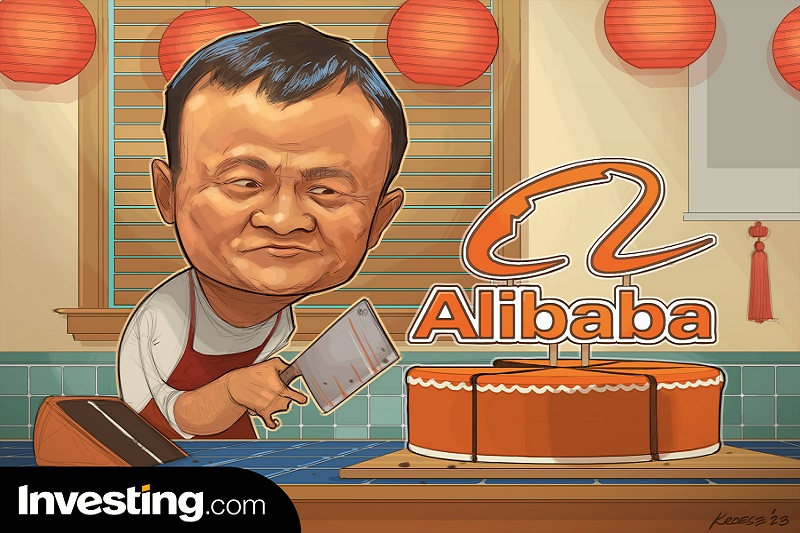By Geoffrey Smith
Investing.com -- Alibaba (NYSE:BABA) Group Holdings has begun a whole new era - and a whole new hype cycle.
The Chinese Internet giant would like you to think that reality will live up to the hype this time. It is creating a narrative of unbundling in the name of efficiency, hoping that its global investor base will look past its emasculation by the Communist Party, which has ended its dreams of dominating every sector from e-commerce to groceries and wealth management.
To put it kindly, the burden of proof is firmly with Jack Ma and his anointed successor, Daniel Zhang.
Alibaba had first-mover advantage in what will be the world’s largest consumer market for the next century and blew it, as its owner’s megalomania led it head-on into a clash with Beijing.
The regulatory crackdown that followed, augmented by the effects of the pandemic and the Federal Reserve’s abrupt tightening of monetary policy last year, wiped out all of the stock’s gains since it listed in 2014. While it has recovered in the weeks since regulators declared the regulatory campaign “basically over”, on a nine-year view, the company has failed to make the most of its initial opportunity, and is unlikely to have a better one in the foreseeable future.
This is not to say that the measures announced by Zhang this week are a bad idea - quite the reverse, in fact. The company has traded at less than the sum of its parts in recent years, and the intention to create standalone operating companies with clear focuses and responsibilities is a classic business-school strategy. Alibaba has already begun to shed the dreaded “conglomerate discount”, adding over $32 billion in market value since the changes were announced.
The measures are an admission of a reality that big U.S. technology companies are also facing: the slowdown in global growth has made it harder to finance big bets on the distant future. Indeed, by announcing plans to spin off its six new operating companies via public offerings, the company is going further than the likes of Amazon (NASDAQ:AMZN) and Alphabet (NASDAQ:GOOGL), where loss-making ‘long-duration’ bets continue to be cross-subsidized internally - at least for now.
Alibaba’s relative transparency makes clear why the steps are needed: only its China Commerce unit - which houses the Taobao marketplace powerhouse - and its cloud division are profitable. In the cloud, as in e-commerce, Alibaba led the way in China. Where it has had to follow others, it has not been successful, at least not if profit, rather than revenue, is the ultimate measure of success.
According to Zhang’s new narrative, the new operating companies will be more agile and more responsible. That too is true. But they will not – as Alibaba has in the past – enjoy the privileges of being virtual monopolists. That ship has sailed.
Nor will there be any more challenges to the dead hand of Communist Party bureaucracy, such as Jack Ma launched before the IPO of Ant Group, which was hastily aborted when the government took offense and decided that the country’s Internet barons had better learn their place. The carefully-staged photo op this week that showed Ma chatting in a relaxed setting with Hangzhou academics about the future of AI sent a clear message that Beijing’s message has been internalized.
Alibaba’s future is now half-General Electric and half-Lukoil. It’s possible – probable, in fact – that the operating companies will generate better returns on their own. And those that don’t can die slow, unspectacular deaths at the hands of their competitors. But do not lose sight of the small print.
As part of the peace deal under which Ant Group may now list its consumer finance unit, it has had to carve out a 10% stake for the government of Hangzhou, whose representative in the board room will most likely be - to put it mildly - first among equals. The risk is that the government’s crackdown has created or will create permanent channels for political interference in its business. Businesses run on those lines are less likely to build the next Taobao.
Vladimir Putin made a similar bargain with Russia’s oligarchs 20 years ago: stay out of politics, and you can keep your fortunes, was the mantra. Twenty years on, the oligarchs have lost their export markets and their yachts to international sanctions, while the once-surefooted Putin has isolated Russia ever more dramatically from Europe.
It is a precedent that none will wish to follow, but it may not be that they have the choice. China’s technology sector is far more dynamic than Russian industry, but ultimately, a knowledge economy will be hard to reconcile with the CCP’s desire for control. The worst may be over for Alibaba, but so too, very probably, is the best.
